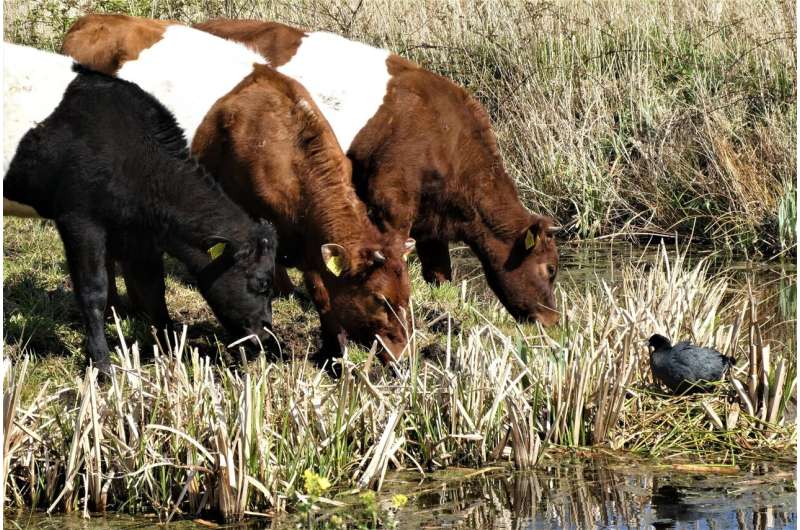This article has been reviewed according to Science X's editorial process and policies. Editors have highlighted the following attributes while ensuring the content's credibility:
fact-checked
trusted source
proofread
A human contracted bird flu—how worried should you be about the virus?

Bird flu is always a concern for health officials, not only for its effects on food supply chains, but for its potential for causing infections in humans. However, rarely, if ever, do humans contract this virus.
But the Texas Department of State Health Services reported on April 1 that a person contracted H5N1, a strain of bird flu.
The agency indicated the person's only symptom is eye inflammation. The person was infected by cattle, a development that could be a cause for concern, according to Sam Scarpino, a public health expert and professor at Northeastern University.
"Bird flu has been around for basically as long as we've been thinking about human flu," Scarpino says. "It's a pretty persistent problem because … it's always spilling over into mammals, including humans. It affects domestic bird population, poultry, et cetera. It's something that we're persistently worried about causing another pandemic, and we're paying attention to it a lot."
The types of flu found in birds often don't make their way to humans. These flus primarily infect birds' gastrointestinal system, which means the cell receptors for the virus are in the gut of the bird. The same cell receptors can be found in humans' lower respiratory tract.
"That means it's harder to get infected because the virus has to get in deeper, past more of the innate immune system," Scarpino said. "But lower respiratory infections are bad and you also then are infected with something that you're totally naive too and your immune system goes haywire."
These infections also can range from mild to severe with high fatality rates. However, given the way the virus travels, it usually doesn't transmit from birds to humans.
"Basically every modern influenza pandemic going back to 1918 and probably pre-1918 had at its origin of bird flu," Scarpino said. "However, that bird flu will have almost certainly spent time in some intermediate host before it caused a human pandemic."
In this case, the virus was found in cattle that likely served as an intermediary host. The specific variant, H5N1, is one found more often than humans.
This bird flu has also moved from sea birds to seals and sea lions, killing thousands across the globe.
The jump between species, along with risk to humans posed by this particular strain, is why public health officials are watching the situation, Scarpino said.
"The reason that we're having this conversation is because everybody's worried about the chance of a pandemic that could be sparked by the transition from a bird flu into a human flu," Scarpino said. "The level of concern in terms of human health is low. … (But) the concern that I have is everything happening right now is pretty unprecedented."
Historically, there have not been a lot of bird flu cases in cattle up until now, Scarpino said. This case could be a fluke and the result of some shifts in cattle movement this year.
Whether the infection is something likely to spread to humans depends on what caused it to spread to cattle and what happens if the cows are spreading it to each other.
Scarpino said the fact the person with the flu only has eye symptoms is promising because it shows the virus may not be readily transmissible. But Scarpino said public health officials need to determine if how and why it's spreading to cattle in order to assess the risk to people.
"It's possible it's just bad luck," he said. "It's totally possible that something unusual happened in Texas. The problem is … I haven't seen a really compelling explanation for what's going on aside from it was just bad luck. Sort of hoping something was bad luck is not great public health policy. We're sort of assuming the cows are more like horses which means they're a bit more susceptible to bird flu and so it's not a big risk but I'd love to have that assumption tested."
Scarpino said pasteurization prevents the virus from infecting milk products. However, the infections could cause a dip in supply that could lead to an increase in prices.
"If we look at it in terms of the food supply supply, we talked about how there's massive culling of poultry to prevent this," said Darin Detwiler, an associate teaching professor of food policy and food safety expert at Northeastern University. "This causes disruption within our supply systems, results in economic losses within the industry and consumers end up paying more for these products."
Ditwiler said there could also be a ban on food products from certain areas where bird flu has spread.
But overall, he said, the average person doesn't have reason to be too worried about bird flu yet.
"If you're not interacting with animals, you don't need to necessarily be concerned," Ditwiler added. "As always, I think consumers should make educated decisions and always buy food from trusted sources. Don't buy meat from some guy's pickup truck on the county highway down by the river. Now is not the time."
This story is republished courtesy of Northeastern Global News news.northeastern.edu.




















